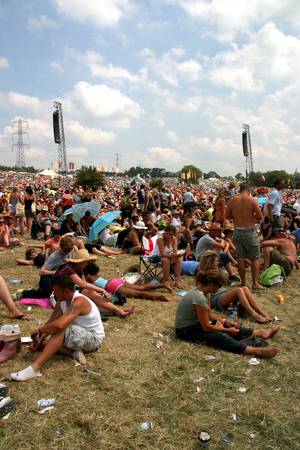Water Aid at Glastonbury
Interview with
Melanie - Water Aid has been involved with Glastonbury since around 1994. It's a dual relationship. We provide a service at the festival. We man the latrines, we do the She-Pees, we do litter picking, and we also receive a donation back from Michael and Emily Eavis who are really, really strong supporters of us. It's a really brilliant place for us to campaign because people are very alive to the issues such as going to the toilet, getting something to drink. Because Water Aid is about helping the world's poorest people get access to safe water and sanitation, people have got a little bit of an insight to what it's like when things that you're used to aren't there, and you're struggling a little bit. At the moment, there are 884 million people in the world who don't have access to safe water and 2.6 billion that don't have something as simple as a toilet. 
Ben - What are the problems that come from not having access to safe water and sanitation?
Melanie - The problems that come with not having safe water and sanitation, there are many layers to it. It's quite startling at the moment that 4,000 children die every day from a lack of safe water and sanitation - diarrheal diseases. That's more than AIDS, malaria and measles combined. And the problem with water fetching is that it's normally the girls who are tasked with having to get all the water so there are times when girls then miss out on education. They miss out in school because they're having to fetch the water. Obviously, health is a very big issue: if you're drinking dirty water, you're getting disease. Your health is bad but also, your ability to go out and work and earn money is also bad, as well as falling out of education. And there are things as simple as when a school has toilets, girls, especially around the age of puberty, are much, much more likely to actually go and get an education. So there are many layers to the reasons why safe water and sanitation are the very essential first steps of getting people out of poverty.
Ben - How do you find people are engaging with your message here?
Melanie - People really engage here. It's a really, really great space for it because the ethos of the festival is all about giving back and social justice and doing good. Of course, the fact that toilets are an issue here, maybe showering is an issue here and again, going to get water is an issue here - it's a really good combination for us. People are very open to it, they are very supportive and it's a really fantastic campaigning spot for us.










Comments
Add a comment